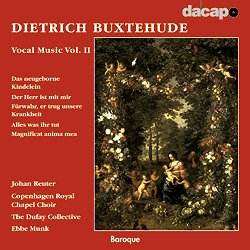Vocal music was not Buxtehude's principal interest,
either by profession or inclination, yet he still produced well over
100 compositions for the voice. DaCapo has entered upon a project to
record this repertoire, and this second volume contains much that is
of interest, performed and recorded to a high standard.
The first thing to state is that all the performances
sound well. The singing is accurate and intonation and ensemble entirely
reliable. The instrumental contributions are rarely ostentatious and
the 'original instruments' of the Dufay Collective balance the voices
and sound just right for the musical style.
Buxtehude's style is both direct and sophisticated.
If the music does not linger in the mind in the way that, say, Bach's
choral music does, it still sounds well and can be enjoyed by that standard
alone. Of the works collected here the Magnificat has a winning directness
and vitality, with plenty of contrasts among the part-writing, including
some colourful solo singing from various members of the Copenhagen Choir.
Better still (and best of all among these pieces?)
is the cantata Fürwahr, er trug unsere Krankheit (Surely He hath
borne our griefs), which has a text of only eight lines, yet spans a
full 12 minutes. The opening sinfonia is arresting, distinguished by
shifting dynamics which make a telling impression, while the vocal writing
is imaginative and varied, again with some distinguished contributions
from individual members of the choir. Johan Reuter is a splendid bass
soloist, in fine voice.
The booklet contains full texts and translations and
has authoritative notes, although the paper is rather thin. This may
not ultimately be the best of Buxtehude, but it is still full of interest
and does much to raise the profile of one of the best composers of the
baroque era.
Terry Barfoot


